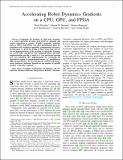Accelerating Robot Dynamics Gradients on a CPU, GPU, and FPGA
Author(s)
Plancher, Brian; Neuman, Sabrina M; Bourgeat, Thomas; Kuindersma, Scott; Devadas, Srinivas; Reddi, Vijay Janapa; ... Show more Show less
DownloadAccepted version (454.4Kb)
Open Access Policy
Open Access Policy
Creative Commons Attribution-Noncommercial-Share Alike
Terms of use
Metadata
Show full item recordAbstract
Computing the gradient of rigid body dynamics is a central operation in many state-of-the-art planning and control algorithms in robotics. Parallel computing platforms such as GPUs and FPGAs can offer performance gains for algorithms with hardware-compatible computational structures. In this letter, we detail the designs of three faster than state-of-the-art implementations of the gradient of rigid body dynamics on a CPU, GPU, and FPGA. Our optimized FPGA and GPU implementations provide as much as a 3.0x end-to-end speedup over our optimized CPU implementation by refactoring the algorithm to exploit its computational features, e.g., parallelism at different granularities. We also find that the relative performance across hardware platforms depends on the number of parallel gradient evaluations required.
Date issued
2021Department
Massachusetts Institute of Technology. Computer Science and Artificial Intelligence LaboratoryJournal
IEEE Robotics and Automation Letters
Publisher
Institute of Electrical and Electronics Engineers (IEEE)
Citation
Plancher, Brian, Neuman, Sabrina M, Bourgeat, Thomas, Kuindersma, Scott, Devadas, Srinivas et al. 2021. "Accelerating Robot Dynamics Gradients on a CPU, GPU, and FPGA." IEEE Robotics and Automation Letters, 6 (2).
Version: Author's final manuscript